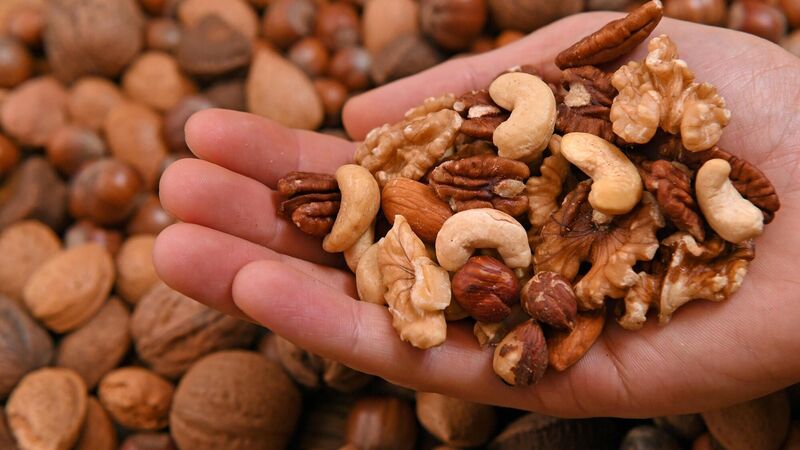Nuts: Should we be eating more?

In recent years my attitude and taste for nuts and seeds has changed, writes Dr Catherine Conlon.
In one of the opening scenes in When Harry Meets Sally, on a road trip from the University of Chicago to New York, much to Sally’s disgust, Harry insists on eating a bunch of grapes and spitting the seeds onto the road.
At one point, he forgets the window is rolled up and splatters grape seeds all over the inside of the window.
Now, with the evidence of the antioxidant health benefits, perhaps Harry should have eaten the grapes whole, seeds and all.
The one chocolate I always avoided in the box was the hazelnut whirl. Chocolate bars with fruit and nut suffered the same fate. Almonds and walnuts – never a fan. Caraway seeds in cakes – no thank-you. Seeds in my view were for birds and rabbits, while nuts were best kept for squirrels, chipmunks, crows and woodpeckers.
But in recent years my attitude and taste for nuts and seeds has changed.
Aligned with celebrity proponents Miley Cyrus, Jennifer Garner and Megan Fox vouching for their health benefits, there is now strong evidence to support incorporating these nutritional nuggets into our daily routines.
Adding them to your diet may improve your mood, sharpen your mind, and fend off chronic diseases.
If there is such a thing as a ‘ideal’ food, nuts and seeds come pretty close to perfection.
High in omega-3 fatty acids that promote heart health, the high protein content of 3 to 7 grams per ounce help muscle repair as well as encouraging weight management by keeping you feeling full.
Generally, nuts are rich in heart healthy fats, vitamins, minerals and antioxidants. Different type of nuts have different nutritional benefits.
High protein nuts include peanuts, cashews, almonds and pistachios.
Nuts high in saturated fats include hazelnuts, macadamias, Brazil and pine nuts, while pecans are high in carbohydrates.
In recent years, people are rediscovering nuts and seeds and eating them much more regularly.
Here are a few of the health benefits you may experience after you eat nuts every day:
Cholesterol
A research review published in the American Journal of Clinical Nutrition (2018) reported that healthy individuals, and those with elevated lipids, who consume 50 to 100g of nuts – such as almonds, peanuts, pecans and walnuts – five times a week significantly reduced their LDL (‘bad’) cholesterol levels.
Added to that, eating hazelnuts, pistachios, and walnuts may help ‘good’ HDL cholesterol levels.
Further research suggests that it is the phytosterols, a group of lipids present in nuts, that may be responsible for reducing LDL levels. The same review noted that pistachios, pine nuts, and almonds had the highest content of phytosterols.
Further research published in Nutrition and Metabolic Insights (2020) found that consuming nuts could lead to a lowering of total cholesterol levels and a lower risk of heart disease.
Antioxidants
Nuts such as almonds contain flavonoids - a group of compounds found in plant-based foods that are rich in antioxidants.
These are substances that can protect cells from damage from free radicals, which have been linked to conditions like diabetes, heart disease, and cancer. They are found in many plant-based foods including nuts. Vitamin E and C are examples of antioxidants.
Some nuts, such as almonds and cashews, have higher concentrations of antioxidants. Almonds and cashews are noted to have the most significant levels of tocopherol, a form of Vitamin E that is associated with lower inflammation and cancer risk, according to a review article in Food Review International (2022).
Weight management
A study in Nutrients (2021) reviewed the evidence of the links between eating nuts and gaining weight. Contrary to the popular belief that eating nuts – peanuts in particular - is a recipe for weight gain, the researchers found no evidence of this.
A later paper in Nutrients (2023) found eating nuts to be beneficial for weight management and prevention of long-term weight gain. This finding could be explained by high levels of protein and fibre in nuts, which increase fullness, reducing hunger and the likelihood of impulse-eating of unhealthy snacks.
Colon cancer
The antioxidant and anti-inflammatory properties of nuts may help to prevent tumour formation.
A study in the International Journal of Food Science and Nutrition (2021) reported that higher nut consumption was linked to a lower risk of colon cancer. However, further research is needed to substantiate these claims.
Risks of nut consumption
While nuts are, on the whole, nutritious, the way they are prepared is important. Nuts that are roasted and salted can be high in sodium, which can increase the risk of high blood pressure and put you at higher risk of heart disease and stroke.
Unsalted nuts are generally better, particularly if you have high blood pressure or diabetes.
Brazil nuts have a high concentration of selenium, which is an antioxidant - important for thyroid health and immunity.
However, two Brazil nuts a day already meet the daily requirement of selenium.
Regularly eating more than that could lead to fatigue, weakness and burning or prickling sensations – all signs of selenium intoxication.
Different types of nuts offer a range of nutrients, so eating a variety of them is recommended.
However, they are calorie dense so eating a small handful of nuts every day is good practice.
If you have underlying conditions such as heart disease, diabetes or high blood pressure, choose unsalted ones rather than salted or flavoured nuts.
They are perfect for snacking, much healthier, and more filling in small quantities than biscuits, chocolate bars, or pastries.
Incorporating nuts in your diet
I like to throw a handful of seeds in my porridge, along with a sprinkling of granola. I often have a portion in my lunch box at work, and include cashew nuts in a chicken curry in the evening.
Almonds go great with blue cheese and pears, and are delicious on top of a slice of coffee cake.
Mixing them up in different dishes at different times of the day maximises the taste and flavour as well as the enormous health benefits.
In the aforementioned movie, when Harry offers Sally some grapes in the car, she demurs – ‘No, I don’t like to eat between meals, I’ll roll down the window,’ reducing the likelihood of a repeat splatter.
If you do feel the need for a snack, a handful of nuts or seeds is a delicious and healthy option to stave off the hunger pangs until your next meal.







 App?
App?


